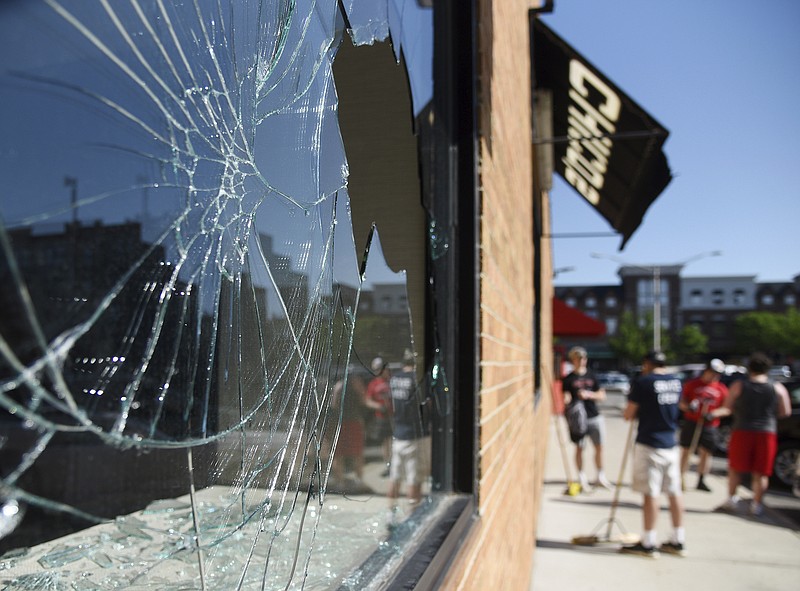The outrage over George Floyd's killing in Minneapolis under the knee of a white police officer is justified. Nationwide demands to end police abuse are legitimate. The fury of black Americans who are tired of generations of injustice is real.
But the rioting and vandalism that overshadowed peaceful protests the past several days represent something vile and shameful. They are counterproductive, criminal actions that cause more grief and setbacks.
Did Chicago look more committed to equality and justice on Sunday morning with broken glass in the streets and pointless graffiti scrawled across dozens of buildings? No. Same for Minneapolis, New York, Seattle, Dallas and other cities where peaceful demonstrations blurred into ugly outbursts.
NO TO ALL VIOLENCE
Some try to argue that violence becomes necessary to compel real change when political pressure and street marches aren't effective. Again, no. Police officers were pelted with bottles and debris in Chicago. They were punched, and at least one was dragged down a street. Protesters were injured, too, with flying objects and during angry outbursts.
Chicago police Superintendent David Brown said that by Sunday morning, more than 200 arrests were made. Law enforcement should use every tool, including hundreds of posts on social media, to identify and prosecute lawbreakers who distract from the trust-building actions that need to take place. Mayhem does not beget political progress. Mayhem begets more chaos that impedes progress.
Brown saw the criminal agitators for what they are: hypocrites. "People are destroying property, meting out violence in the memory of a man who was unjustly killed, murdered by police officers," Brown said Saturday night.
MISTRUST, FRUSTRATION
In the end, violence sidetracks. Peaceful marches and rallies unite communities and should continue. They allow for voices to be heard, which is part of what will be required to confront racism and soften the broken relationship between minority Americans and law enforcement.
In Minneapolis, peaceful black protester Patrick Smith told CNN in an impassioned street interview that his mistrust of police is consuming and exhausting. "We do not want to go through this anymore," Smith said. He wants to feel safe in white neighborhoods. If a police officer is driving behind him, he doesn't want to have to clench and be tense. "I want to just be free and not have to think about every step I take. Because at the end of the day, being born black is a crime to them."
Mistrust of police is universally understood by black Americans, even as police forces have grown more diverse. Chicago has tried to attract more minority officers; the force is about one-fifth black. More can and should be done to diversify law enforcement ranks.
For Chicago, part of the tragedy of a white Minneapolis police officer using his knee to choke the life out of George Floyd, a black man, was its familiarity. Floyd became a Minneapolis version of Laquan McDonald, the black teen shot 16 times by a white officer. That officer, Jason Van Dyke, was convicted of second-degree murder.
Chicago is not alone. In cities across the U.S., allegations of police misconduct, abuse of authority and mistrust have sparked a sometimes reckless backlash against good and compassionate officers who are dedicated to protecting the public. Frustration is mounting on all sides. And in an increasingly polarized nation, extremist groups are stepping in to take advantage of the tension.
Nothing is easy about achieving social progress. Peaceful protests are encouraged and should be protected. Let marches continue as one step forward.
To the rest, to those who would destroy instead of build, we'll repeat the mantra of Atlanta's mayor, Keisha Lance Bottoms, who pleaded over the weekend to rioters in her city: Go home. Go. Home.
The Chicago Tribune
